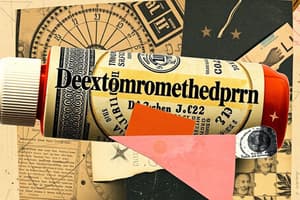Podcast
Questions and Answers
What are antitussive drugs used for?
What are antitussive drugs used for?
Suppressing the cough reflex
Which of the following forms can dextromethorphan be available in?
Which of the following forms can dextromethorphan be available in?
- Capsules
- Lozenges
- Syrups
- All of the above (correct)
Dextromethorphan is processed primarily by the __________.
Dextromethorphan is processed primarily by the __________.
liver
Dextromethorphan is contraindicated for patients with asthma.
Dextromethorphan is contraindicated for patients with asthma.
List two adverse effects of dextromethorphan toxicity.
List two adverse effects of dextromethorphan toxicity.
Which substances can interact with dextromethorphan?
Which substances can interact with dextromethorphan?
What is a significant precaution for using dextromethorphan?
What is a significant precaution for using dextromethorphan?
Dextromethorphan is safe for use in children younger than 2 years old.
Dextromethorphan is safe for use in children younger than 2 years old.
Dextromethorphan is classified as a pregnancy category ___ drug.
Dextromethorphan is classified as a pregnancy category ___ drug.
Study Notes
Antitussive Drugs
- Antitussive drugs suppress the cough reflex.
- Coughing is a protective mechanism that removes irritants from the respiratory system and improves airflow.
Dextromethorphan: Prototype Drug
- Dextromethorphan suppresses nonproductive coughs.
- Available in capsules, lozenges, chewable tablets, syrups, and extended-release oral suspensions.
Pharmacokinetics
- Rapidly absorbed from the gastrointestinal tract (GIT).
- Onset of action is 15 to 30 minutes.
- Metabolized by the liver.
- Excreted by the kidneys (some is eliminated unchanged).
Pharmacodynamics
- Chemically related to opioid agonists.
- Suppresses coughs by directly affecting the cough center in the medulla.
- Therapeutic doses do not affect ciliary action.
Contraindications
- Chronic coughs caused by emphysema and asthma.
Precautions
- Use with caution in patients with hepatic impairment and during pregnancy.
Adverse Effects
- Dextromethorphan toxicity:
- Nausea
- Vomiting
- Drowsiness
- Dizziness
- Irritability
- Restlessness
- Excessive doses can lead to dextromethorphan poisoning.
Drug Interactions
- Dextromethorphan interacts with other central nervous system (CNS) depressants like:
- Monoamine oxidase inhibitors (MAOIs)
- Fluoxetine (selective serotonin reuptake inhibitor - SSRI)
- Quinidine
- Sibutramine
Patient Variables
- Contraindicated in patients with emphysema or asthma.
- Evaluate patients for drug interactions, especially with antidepressants.
- Assess for history of hepatic insufficiency as dextromethorphan is processed by the liver.
- Pregnancy category C drug: Use with caution during pregnancy.
- Not indicated for children under 2 years old.
- Assess adolescent patients for potential abuse.
Lifestyle, Diet, and Habits
- Advise patients not to drive or perform tasks requiring alertness while taking dextromethorphan.
- Alert patients not to consume alcohol while taking dextromethorphan as it can increase sedation.
- Caution about potential for abuse of dextromethorphan.
- Assess frequency of grapefruit or orange juice ingestion, as these juices can increase dextromethorphan concentration.
Environment
- Alert patients not to take any over-the-counter (OTC) drugs while taking dextromethorphan as it could increase sedation.
Nursing Diagnosis and Outcomes
- Risk for Injury related to sensory-perceptual alteration from drug-induced drowsiness and sedation
- Desired outcome: Patient will remain free from injury related to sedation and drowsiness.
- Risk for Ineffective Airway Clearance related to suppression of cough reflex
- Desired outcome: Patient will maintain their baseline respiratory function.
Studying That Suits You
Use AI to generate personalized quizzes and flashcards to suit your learning preferences.
Related Documents
Description
This quiz covers the essential aspects of antitussive drugs, focusing on Dextromethorphan, its pharmacokinetics, pharmacodynamics, contraindications, and precautions. Test your understanding of how these medications suppress cough reflexes and their therapeutic use. Perfect for students of pharmacology looking to reinforce their knowledge.




